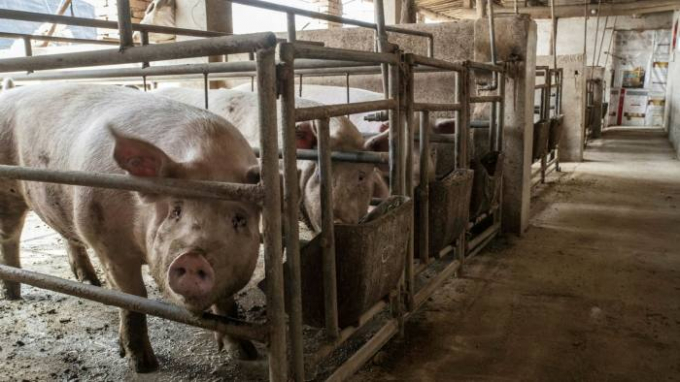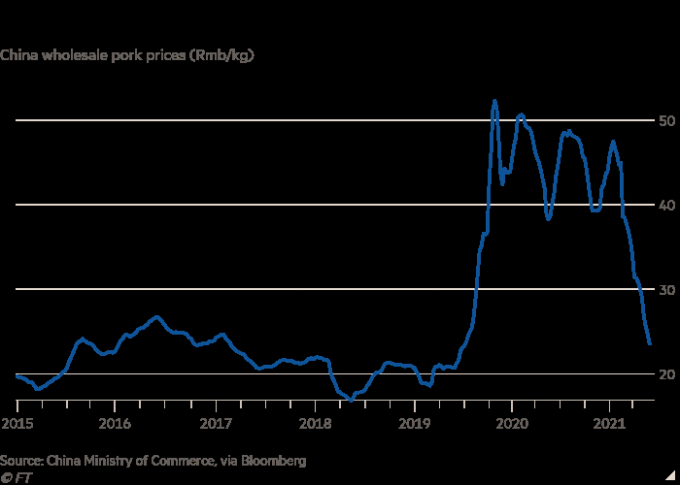May 23, 2025 | 21:21 GMT +7
May 23, 2025 | 21:21 GMT +7
Hotline: 0913.378.918
May 23, 2025 | 21:21 GMT +7
Hotline: 0913.378.918
Hog futures in China have fallen to record lows as mass slaughtering of pigs prompts fears that the world’s second-biggest economy faces a deluge of pork.

Wholesale pork prices in China have dropped almost 50% this year © Bloomberg
Rising concerns that the local pork market is becoming inundated have led to a more than 30 per cent fall in Dalian-traded hog futures, which allow investors to bet on the future direction of prices, since they were launched in January.
The situation contrasts with that in the world’s biggest producer, consumer and importer of pork over much of the past two years, when outbreaks of African swine fever resulted in price surges on fears of supply shortfalls.
Prices have been hit as authorities have encouraged farmers to raise more pigs and replenish the country’s pork reserves following outbreaks of ASF.
Analysts said that the situation had been made worse by farmers, concerned that prices will fall further, bringing forward plans to cull their herds. Oversupply fears have also been stoked by some farmers fattening their sows to weights of up to 300kg-400kg — comparable with some polar bears — versus their usual 200kg, according to Chinese media reports.
On Tuesday, hog futures on the Dalian Commodity Exchange dropped as much as 7.1 per cent to a trough of Rmb18,550 ($2,900) per metric tonne after it was reported that smaller pigs were also being slaughtered, adding even more supply.
Wholesale pork prices in China have dropped almost 50 per cent this year to Rmb23.57 per kilogramme, their lowest price since late 2019.

“It’s definitely surprising how fast and far pork prices have fallen,” said Darin Friedrichs, an analyst at commodities broker StoneX Group in Shanghai.
China has struggled to get a grip on pork price fluctuations since ASF began tearing through the country’s hog herds in 2018.
Analysts said the latest drop in futures prices was partly a response to a report issued by Beijing’s Xinfadi market, a large wholesale market in the capital, on Friday that noted that smaller pigs were being brought for sale.
This “indicates some farms have significantly lowered their expectations for future meat prices and . . . are slaughtering ahead of schedule”, according to the report.
The latest price swings prompted China’s cabinet, the National Development and Reform Commission, to publish a policy statement last week promising to “maintain supply and stabilise prices in the pork market”, without specifying what the measures were.
Pork prices are a significant component in China’s consumer price index, and their volatility has been a driver of its performance over the past year. Falling pork prices late last year helped push inflation into negative territory for the first time in over a decade.
Friedrichs, at StoneX, said policymakers had hoped the introduction of futures contracts would help smooth out boom and bust cycles in Chinese pork prices.
“Now we’re in a bust cycle, so the volatility is still there,” he said.
(Finacial Times, Bloomberg)

(VAN) Alt Carbon has raised $12 million in a seed round as it plans to scale its carbon dioxide removal work in the South Asian nation.

(VAN) Attempts to bring down the price of the Japanese staple have had little effect amid a cost-of-living crisis.

(VAN) Fourth most important food crop in peril as Latin America and Caribbean suffer from slow-onset climate disaster.

(VAN) Shifting market dynamics and the noise around new legislation has propelled Trouw Nutrition’s research around early life nutrition in poultry. Today, it continues to be a key area of research.

(VAN) India is concerned about its food security and the livelihoods of its farmers if more US food imports are allowed.

(VAN) FAO's Director-General emphasises the need to work together to transform agrifood systems.

(VAN) Europe is facing its worst outbreak of foot-and-mouth since the start of the century.